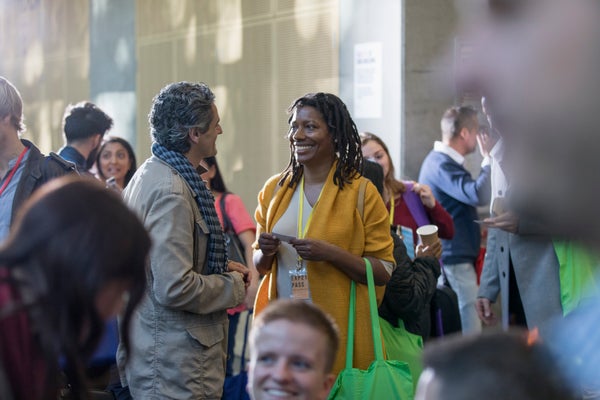This article was published in Scientific American’s former blog network and reflects the views of the author, not necessarily those of Scientific American
Climate change will upend the world in an array of disastrous ways—droughts, floods, fires, hurricanes, sea level rise. It will change our lives in a plethora of devastating ways—famine, migration, inundation, desertification, disease, conflict. Yet we barely talk about it. All too rarely do we sit down for deep, nuanced, and fact-based discussion of what climate change practically means for humanity. While some of us spend a lot of time reading and worrying about it, seldom do we gather in a room together to consider where the science is pointing and what we might collectively do about it.
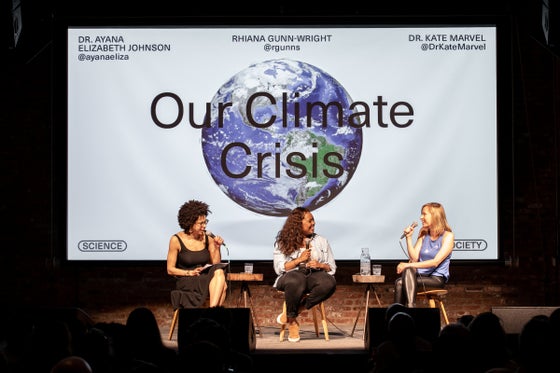
Left to right: Ayana Elizabeth Johnson of Ocean Collectiv, Rhiana Gunn-Wright of New Consensus and Kate Marvel of NASA onstage at the Our Climate Crisis event at Pioneer Works. Credit: Walter Wlodarczyk and Pioneer Works
Further, seldom are these climate conversations led by or do they even include women and people of color. As Media Matters calculated, coverage of climate change on TV news actually declined—by 45 percent!—from 2017 to 2018. In what coverage there was last year, only 19 percent included women, and only 9 percent included people of color. Not only do we need to talk about this existential issue way, way more; but also, if we are going to build a movement big enough to actually mitigate climate impacts, it is critical to have a diversity of spokespeople and collaborators. We need all hands welcomed on deck.
On supporting science journalism
If you're enjoying this article, consider supporting our award-winning journalism by subscribing. By purchasing a subscription you are helping to ensure the future of impactful stories about the discoveries and ideas shaping our world today.
In the last two years, my mantra has become: Building community around solutions is the most important thing. So, earlier this month I hosted an event that gathered hundreds of people at Pioneer Works in Brooklyn to confront this topic in no uncertain terms. The event was called “Our Climate Crisis.” Experts Rhiana Gunn-Wright, a director at New Consensus and policy lead for the Green New Deal
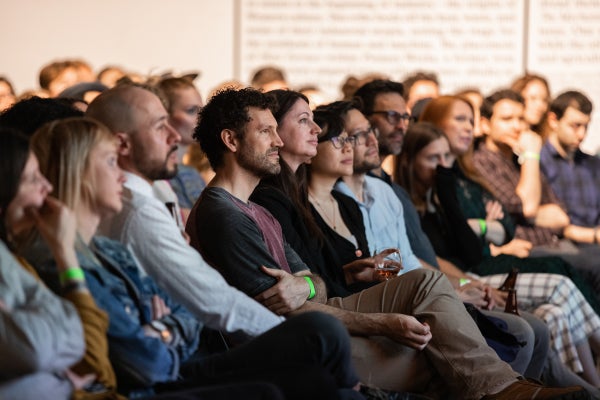
The audience at the Our Climate Crisis event at Pioneer Works on April 13th. Credit: Walter Wlodarczyk and Pioneer Works
,* and Kate Marvel, climate scientist at NASA and Columbia University, joined me on stage for a brutally honest and gloriously irreverent discussion. Standing room only on a beautiful Saturday night—we were shocked and heartened by the level of interest. More importantly, this conversation continued off stage until midnight, with scientists, activists and concerned citizens breaking bread and forming relationships that inch us closer to implementing solutions.
The event description promised that we would “grapple with the scientific realities of the cultural, governmental, and corporate shifts needed to mitigate our climate crisis.” Grapple we did. Topics ranged from the role of science in policy making, to why health care needs to be part of addressing the climate crisis, to the massive force of youth activism, to the actual text of the Green New Deal resolution, to how can we pay for it, to gaps in scientific understanding, to equity and justice, to whether hope is needed and where we might find it. We also laughed more than anyone could have anticipated. A few abridged snippets from the conversation are below, and the full video is now online.
Most importantly: Talk about climate change. With your friends, colleagues, neighbors, church, school, sports team, family. We can’t do anything real about it, we can’t mobilize at the needed scale, unless we face this existential challenge head on—collectively and with clarity—grounded in science, and focused on solutions.
On why they were drawn to climate work:
Ayana Elizabeth Johnson: When and how did trying to prevent the apocalypse become your day job?
Rhiana Gunn-Wright: I'm black. Which apocalypse?
AEJ: This is a great question. This is in fact the question. People ask, “Why is equity part of the Green New Deal?” We're going to get into that later. For now, specifically the climate change apocalypse.
RGW: I got into climate from an environmental justice perspective. Before, I was working on higher ed, I was working with single parents, and all I ever really knew about the environment was solar panels. I was like, I don't understand how I'm supposed to tell this woman who's really struggling with childcare that she should get solar panels. Then I dove in and really started to understand the intersections.
Kate Marvel: I came into it through being a nerd. In the course of doing a PhD, I was studying the entire universe and I realized that most of the universe sucks. This is the only good planet. Other galaxies are fine, but all of my friends live here. There is no whiskey anywhere else in the universe. This is the only planet with whiskey. I still want to do physics, I still want to do science, but I want to do something that feels tangible and that matters to people.
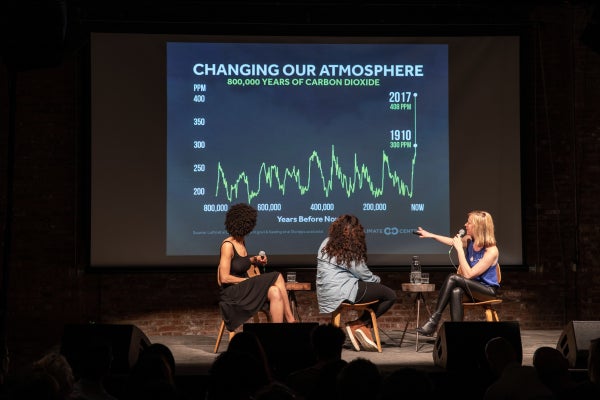
Kate Marvel giving the crowd a run down of a key piece of evidence that humans are causing climate change. Credit: Walter Wlodarczyk and Pioneer Works
On where climate science points us:
KM: There is absolutely no doubt whatsoever that global average temperatures are increasing. We've warmed about a degree Celsius already. A lot of people like to tell climate scientists, "Oh, don't you know climates always change?" And we're like, yeah, we know, we figured that out. We told you that.
Saying, “Let's prevent climate change,” that ship has sailed. We can't do that, but does that mean we throw up our hands and we say, “Well, we missed that target, so everybody just have a party while the world burns”? I don't think that's a good idea either because a degree-and-a-half warmer world is better than a two-degree world. A two-degree world is better than a three-degree world. A three-degree world is better than a four-degree world.
AEJ: I have to remind myself of this every day. Every tenth of a degree really matters to the quality of life that's possible for this planet, and to who is bearing the brunt of that.
On the Democratic politics of the Green New Deal:
AEJ: The thing that sticks out for me is how many co-sponsors there are because it's always portrayed as Representative Ocasio-Cortez’s thing.
RGW: There's like 90 co-sponsors.
AEJ: So, has the democratic party thrown its weight behind the Green New Deal at all?
RGW: I mean yes and no. There's lots of the Democratic party that is excited about it and working on it. There are lots that say that putting equity and environment together is a mistake. Then there are others that are just like, ha ha, we will do this better with adults in the room. So it's like a three way split. But I think there is uniting around the fact that we need a climate policy.
AEJ: And do you feel like the Green New Deal is what instigated that?
RGW: Hell yeah. The reason that people are now saying we need climate legislation is because they're afraid. They're afraid of getting primaried, they're afraid of Sunrise Movement and other groups sitting in their offices, they're afraid of getting a video out on the internet of them clashing with children. They're afraid of what could happen and they're afraid of being laggards. They see a fight forming, and everybody ain’t mean to be a boxer.
On the role of science in policy making:
KM: We want to work with policy makers—I really want it to be a two way dialogue. And the way to stop climate change, is to either take those greenhouse gases out of the atmosphere, or not put them there. There is so much that you can do knowing only that basic fact. But we cannot stop climate change. It's already here. So the question of how do we use science to really anticipate what's coming, I think we can play a role there.
On the inclusion of equity and health care in Green New Deal:
AEJ: People are asking, "Why do you have to care about equity in the process of reforming our entire country to deal with this crisis?" So tell us a little bit about how that conversation is going down around the “systemic injustices” piece.
RGW: Well the conversation has been more difficult than I anticipated. I think that's partially because of my background. I've mostly worked in social policy where there's an understanding that different systems connect up to what you see. So whereas I thought it would be like, "Oh, here's some climate legislation. I care about that. If I have to have a side of universal health care, whatever, it's cool." And it was much more like, "Let me talk to your manager!" And I was like, "Damn!"
AEJ: So why health care? I mean that kind of caught me off guard at first too.
RGW: People like to talk about the Green New Deal as a progressive wish list, but it ignores the fact that it is based in industrial policy. How do you invest in industry? How do you rebuild the economy? How do you invest in the makers and the economy to turn this around? And if you are not only going to protect people during economic transition, but allow them to participate, you need things that allow your workforce, your entire population, to be educated, mobile and healthy.
AEJ: So, if I can't move to take a job in a solar factory because I'll lose my health care, we have this problem where people can't actually participate in this transformation in the economy because they can't afford to take that leap.
On what scares them most:
KM: There's a lot about climate change that's really scary to me. Sea level rise, increased heat waves. Stronger hurricanes. These are things that really scare me. But the thing that scares me the most, is I know exactly what a column of water vapor does when you heat it up, because I'm a physicist and I care about that. But I don't know what people do when you heat them up.
And so the thing that scares me the most is what we are going to do to each other. The impacts of climate change don't need to be the entire world burns down and we all die in order to be something that we really care about. You can't care about climate change or the economy. You can't care about climate change or equity. If you care about equity, you have to care about climate change. If you care about jobs, you have to care about climate change. That's something that the science does really support.
RGW: The idea that climate change would make me very fearful.... I'm already afraid when I drive cross-country. I'm afraid when I see a cop, I'm afraid when my husband is away from me, navigating this world as a black man. I'm afraid that I raised a bad dog. I'm afraid of lots of things. And so I don't know, this has never been my first existential crisis. And so I guess it feels like I've lived with this uncertainty that the life and people that I love … that there were systems that could destroy us.
On their relationship with hope:
KM: People come up to me at parties, and when they find out what I do, they're like, “You must be so depressed,” and I'm like, “That's rude.” I feel like people are sometimes disappointed that I'm not more depressed…. I don't think hope is required. Can you imagine if Lord of the Rings were like, “Well, that seems like a really hard thing. Let's just give up right now”? It would've saved a lot of pages, but the hero's journey is not the hero demanding assurance that everything's gonna be okay in the end. These stories are really meaningful to us because we know that if you know what the right thing to do is, it doesn't really make sense to demand proof that there's gonna be a happy ending before you start out on the path.
RGW: Honestly, this work has made me probably more hopeful than any other area that I've worked on. It's made me gentler. Mostly, what gives me hope is seeing how hard people are fighting. When I look at the school strikes, when I see Greta Thunberg telling journalists to their face, “I don't need hope, I just need action. Please go,” and I'm like, yes, Greta. One of the things that we do is try to figure out how this will happen which means that we have to bring lots of experts from lots of areas together, and I have seen people that had direct beef with one another stay in the room, because they're like, this is what we have to do.
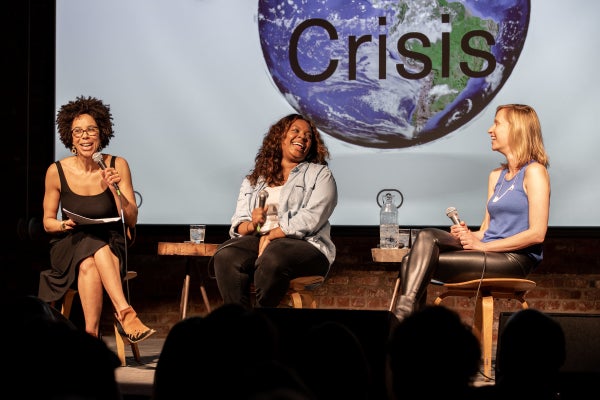
Finding the humor and humanity amidst it all. Credit: Walter Wlodarczy and Pioneer Works
This event was part of the Science & Society series that I curate and host with the Science Studios at Pioneer Works, funded by Science Sandbox. Our next events will be in the fall, will be free and open to the public, and will also include leading experts deeply discussing big topics—from biomimicry, to plastics, to microbes, to love.
For more from Kate Marvel, check out
her TED talk, her Scientific American blog, and follow her on Twitter @DrKateMarvel. For more from Rhiana Gunn-Wright, read about the vision and practicalities of the Green New Deal in this position paper from think tank New Consensus, and follow her at @rgunns.
* Author’s note: The Green New Deal resolution is only 13 pages (double-spaced and large font). I highly recommend reading it so we can all have an informed discussion of potential policy approaches.
